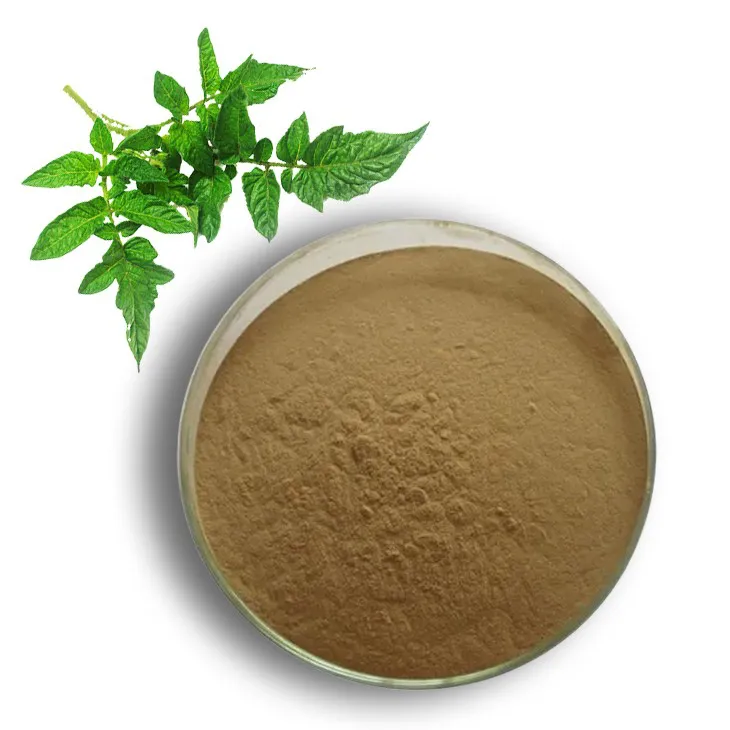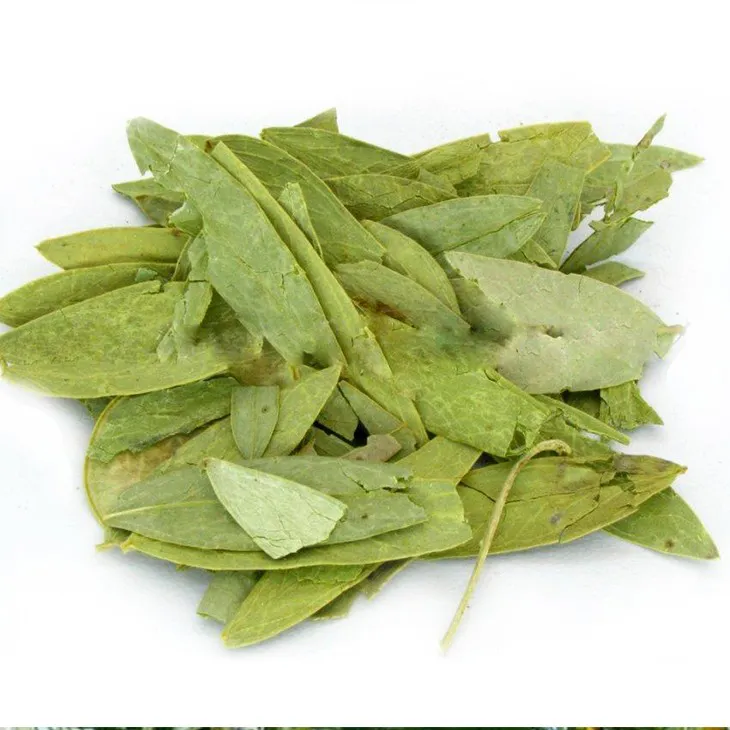- 0086-571-85302990
- sales@greenskybio.com
Powerful Senna Leaf Extract: Its Role in Athletic Performance.
2024-11-12

1. Introduction
In the world of sports, athletes are constantly seeking natural substances that can enhance their performance, aid in recovery, and improve overall well - being. One such substance that has recently come under the spotlight is Senna Leaf Extract. Senna has a long history of use in traditional medicine, but its application in the realm of athletics is a relatively new area of study. This article aims to explore the various aspects of Senna Leaf Extract in relation to athletic performance, from its potential benefits during exercise to its role in post - workout recovery, while also considering any associated risks.

2. Senna Leaf Extract: An Overview
Senna is a plant that belongs to the Fabaceae family. The leaves of the senna plant are rich in various bioactive compounds, including anthraquinones, flavonoids, and tannins. The most well - known and studied components of senna leaf extract are the anthraquinones, such as sennoside A and sennoside B. These compounds are responsible for the laxative effects that senna is typically associated with in traditional medicine. However, recent research has suggested that senna leaf extract may have other properties that could be relevant to athletic performance.

3. Physiological Effects During Exercise
3.1. Metabolism
One area of interest is the potential impact of senna leaf extract on metabolism during exercise. Some studies have proposed that certain compounds in senna may influence the body's energy production pathways. For example, it has been hypothesized that the flavonoids in senna could enhance mitochondrial function. Mitochondria are the powerhouses of the cells, responsible for producing adenosine triphosphate (ATP), which is the primary source of energy for muscle contractions during exercise. If senna leaf extract can indeed improve mitochondrial function, it could potentially lead to increased energy availability during workouts, allowing athletes to perform at a higher intensity for longer periods.
3.2. Muscle Function
Another aspect to consider is the effect on muscle function. There is some evidence to suggest that senna leaf extract may have a positive impact on muscle contractility. It is thought that the bioactive compounds in senna may interact with the muscle cell membranes, modulating the flow of ions such as calcium. Calcium is crucial for muscle contraction, and any regulation of its movement within the muscle cells could potentially enhance muscle performance. Additionally, senna may also have anti - inflammatory properties that could be beneficial for muscle health during exercise. Intense exercise can often lead to muscle inflammation, which can impede performance and recovery. By reducing inflammation, senna leaf extract could help athletes maintain optimal muscle function.
3.3. Cardiovascular Effects
The cardiovascular system plays a vital role during exercise, and senna leaf extract may also have an impact in this regard. Some research has indicated that senna could potentially affect blood pressure and heart rate. While the exact mechanisms are still not fully understood, it is possible that the anthraquinones in senna may interact with the blood vessels, causing vasodilation or vasoconstriction. This could, in turn, influence blood flow to the working muscles, ensuring an adequate supply of oxygen and nutrients. However, it is important to note that any significant changes in blood pressure or heart rate need to be carefully monitored, as extreme alterations could have negative consequences for the athlete.

4. Post - Workout Recovery
4.1. Reducing Muscle Soreness
After a strenuous workout, muscle soreness is a common complaint among athletes. Senna leaf extract may offer some relief in this area. As mentioned earlier, its anti - inflammatory properties could help reduce the inflammation associated with muscle damage, which is a major contributor to post - workout soreness. By alleviating muscle soreness, athletes may be able to return to training sooner and with less discomfort.
4.2. Facilitating Nutrient Uptake
During the recovery phase, the body needs to replenish nutrients that were depleted during exercise. Senna leaf extract may play a role in facilitating nutrient uptake. It has been suggested that the compounds in senna could enhance the absorption of certain vitamins and minerals in the intestines. For example, it may improve the absorption of iron, which is essential for oxygen transport in the body and is often depleted during intense exercise. By promoting better nutrient uptake, senna could contribute to a more efficient recovery process.
4.3. Supporting the Immune System
Intense exercise can temporarily suppress the immune system, making athletes more susceptible to infections. Senna leaf extract may have immunomodulatory effects that can help support the immune system during the post - workout period. Some of the bioactive compounds in senna, such as the flavonoids, have been shown to have antioxidant and anti - microbial properties. These properties could help protect the body from oxidative stress and pathogens, respectively, thereby reducing the risk of illness and promoting faster recovery.
5. Potential Risks Associated with Senna Use in Athletics
5.1. Gastrointestinal Disturbances
One of the most well - known risks associated with senna is gastrointestinal disturbances. Due to its laxative properties, excessive use of senna leaf extract can lead to diarrhea, abdominal cramps, and nausea. In the context of athletics, these symptoms can be particularly debilitating as they can disrupt training schedules and lead to dehydration. Athletes need to be cautious when using senna to ensure that they do not experience these adverse gastrointestinal effects.
5.2. Electrolyte Imbalance
Diarrhea caused by senna use can also result in an electrolyte imbalance. Electrolytes, such as sodium, potassium, and chloride, are essential for normal muscle and nerve function. A significant loss of electrolytes through diarrhea can lead to muscle cramps, weakness, and even more serious complications such as cardiac arrhythmias. Athletes should be aware of this risk and take appropriate measures, such as consuming electrolyte - rich fluids, if they choose to use senna leaf extract.
5.3. Dependency and Abuse Potential
There is also a concern about the potential for dependency and abuse of senna. Prolonged and excessive use of senna for its laxative effects can lead to a condition known as "cathartic colon," where the colon becomes less responsive to normal stimuli. In the context of athletic performance enhancement, there is a risk that some athletes may overuse senna in an attempt to achieve quick results, without fully understanding the long - term consequences. This could lead to serious damage to the gastrointestinal tract and overall health.
6. Conclusion
In conclusion, senna leaf extract has shown some potential in various aspects of athletic performance, from its possible effects on physiological processes during exercise to its role in post - workout recovery. However, it also comes with significant risks that cannot be ignored. Athletes and sports professionals need to carefully weigh the potential benefits against the possible adverse effects before considering the use of senna leaf extract. Further research is also needed to fully understand the mechanisms of action of senna in relation to athletic performance and to develop safe and effective guidelines for its use.
FAQ:
What are the main physiological processes during exercise that senna leaf extract might affect?
Senna leaf extract may potentially influence processes such as digestion and metabolism during exercise. It could potentially affect the digestive system's function, which in turn might impact how the body absorbs and utilizes nutrients during physical activity. Regarding metabolism, it might play a role in energy conversion and utilization, although more research is needed to fully understand these potential effects.
How does senna leaf extract contribute to post - workout recovery?
There are some proposed ways in which senna leaf extract could aid post - workout recovery. It may help with the elimination of waste products from the body more efficiently. This could potentially reduce muscle soreness and fatigue as waste build - up can contribute to these post - exercise symptoms. However, scientific evidence on this aspect is still not fully conclusive.
What are the potential risks of using senna for athletic enhancement?
One of the main potential risks is over - stimulation of the digestive system, which can lead to diarrhea, abdominal cramps, and dehydration. This can be especially harmful for athletes as it can disrupt the body's fluid and electrolyte balance, negatively affecting performance and overall health. There may also be potential interactions with other supplements or medications that athletes might be taking.
Is there enough scientific evidence to support the use of senna leaf extract in athletics?
Currently, the scientific evidence regarding the use of senna leaf extract in athletics is limited. While there are some initial studies suggesting potential benefits in terms of physiological processes during exercise and post - workout recovery, more comprehensive and large - scale research is required. As of now, it cannot be definitively stated that there is sufficient evidence to support its widespread use in athletic settings.
How should athletes use senna leaf extract if they decide to incorporate it?
If athletes choose to use senna leaf extract, they should first consult with a healthcare professional or a sports nutritionist. Dosage is a crucial factor, as too much can lead to the aforementioned risks. They should also monitor their body's response closely, looking for any signs of adverse effects such as digestive discomfort or changes in normal bodily functions. Additionally, it should be used in conjunction with a well - balanced diet and proper training regimen.
Related literature
- The Effects of Botanical Extracts on Athletic Performance: A Review"
- "Senna Leaf: Chemical Composition and Potential Health Effects"
- "The Role of Natural Supplements in Exercise Physiology"
- ▶ Hesperidin
- ▶ Citrus Bioflavonoids
- ▶ Plant Extract
- ▶ lycopene
- ▶ Diosmin
- ▶ Grape seed extract
- ▶ Sea buckthorn Juice Powder
- ▶ Fruit Juice Powder
- ▶ Hops Extract
- ▶ Artichoke Extract
- ▶ Mushroom extract
- ▶ Astaxanthin
- ▶ Green Tea Extract
- ▶ Curcumin
- ▶ Horse Chestnut Extract
- ▶ Other Product
- ▶ Boswellia Serrata Extract
- ▶ Resveratrol
- ▶ Marigold Extract
- ▶ Grape Leaf Extract
- ▶ New Product
- ▶ Aminolevulinic acid
- ▶ Cranberry Extract
- ▶ Red Yeast Rice
- ▶ Red Wine Extract
-
White Peony Extract
2024-11-12
-
Nettle leaf extract
2024-11-12
-
Alfalfa Meal
2024-11-12
-
Mangosteen extract powder
2024-11-12
-
Giant Knotweed Extract
2024-11-12
-
Epimedium extract powder
2024-11-12
-
Diosmin
2024-11-12
-
White mustard seed extract
2024-11-12
-
Hawthorn Extract
2024-11-12
-
Moringa powder
2024-11-12





















